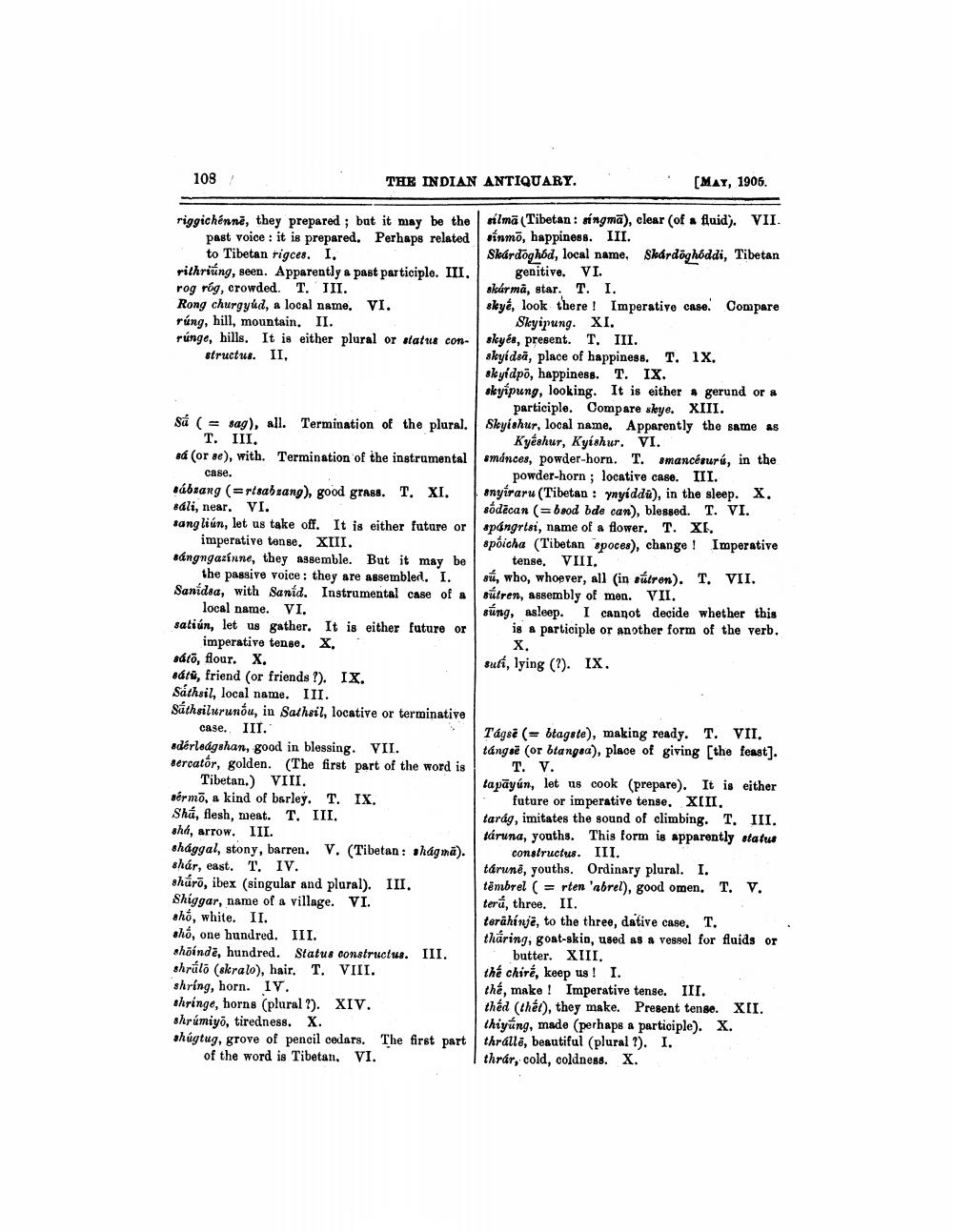________________
108/
THE INDIAN ANTIQUARY.
.
. .
(May, 1905. M
riggichénna, they prepared ; but it may be the silmā (Tibetan: ringmä), clear (of fluid). VII.
past voice : it is prepared. Perhaps related vinmo, happiness. III. to Tibetan rigces. I.
Skardöghód, local name, Skárdöghóddi, Tibetan rithriúng, seen. Apparently a past participle. III. genitive. VI. rog rog, crowded. T. III.
skárma, star. T. I. Rong churgyúd, a local name. VI.
skyé, look there! Imperative case! Compare rúng, hill, mountain. II.
Skyipung. XI. runge, hills. It is either plural or status con- skyés, present. T. III. structus. II.
skyidea, place of happiness. T. ix. sk yidpo, happiness. T. IX. skyipung, looking. It is either gerund or a
participle. Compare skye. XIII. sá ( = sag), all. Termination of the plural. Skyishur, local name. Apparently the same as T. III.
Kyéshur, Kyishur. VI., sú (or se), with. Termination of the instrumentalsmances, powder-horn. T. Smancérurú, in the case.
powder-horn ; locative case. III. tábzang (=rtsabsang), good grass. T. XI. snyiraru (Tibetan : ynyíddu), in the sleep. X. sli, near. VI.
sódēcan (= bood bde can), blessed. T. VI. sang liún, let us take off. It is either future or spángrtsi, name of a flower. T. XI. imperative tense. XIII.
spôicha (Tibetan spoces), change ! Imperative sángngazínne, they assemble. But it may be tense. VIII.
the passive voice: they are assemblert. I. sú, who, whoever, all (in sútron). T. VII. Sanidaa, with Sanid. Instrumental case of a sútren, assembly of men. VII. local name. VI.
sung, asleep. I cannot decide whether this satiún, let us gather. It is either future or is a participle or another form of the verb. imperative tense. x.
X. sáto, flour. X
sutí, lying (?). IX. sátů, friend (or friends ?). IX. Sáthsil, local name. III. sáth silurunou, in Sathsil, locative or terminative case. III.
Tágse (= btagste), making ready. T. VII. sdérleágshan, good in blessing. VII.
táng së (or bangsa), place of giving [the feast]. sercator, golden. (The first part of the word is T. V. Tibetan.) VIII.
lapāyún, let us cook (prepare). It is either sérmő, a kind of barley. T. IX.
future or imperative tense, XIII. Shá, flesh, meat. T. III.
tarág, imitates the sound of climbing. T. III. shi, arrow. III.
táruna, youths. This form is apparently status shággal, stony, barren. V. (Tibetan : shagma). constructus. III. shár, east. T. IV.
tárunē, youths. Ordinary plural. I. shúro, ibex (singular and plural). III.
tēmbrel ( = rten 'abrel), good omen. T. V. Shiggar, name of a village. VI.
terá, three. II. sho, white. II.
terähinja, to the three, dative case. T. shó, one hundred. III.
thåring, goat-skin, used as a vessel for fluids or shõindē, hundred. Status constructus. III. * butter. XIII. shrálo (skralo), hair. T. VIII.
the chiré, keep us! 1. shring, horn. IV.
thé, make! Imperative tense. III. shringe, horns (plural ?). XIV.
théd (thét), they make. Present tense. XII. shrúmiyo, tiredness. X.
thiyáng, made (perhaps a participle). X. shúgtug, grove of pencil cedars. The first part thrallē, beautiful (plural ?). I. of the word is Tibetan, VI.
I thrar, cold, coldness. X.




